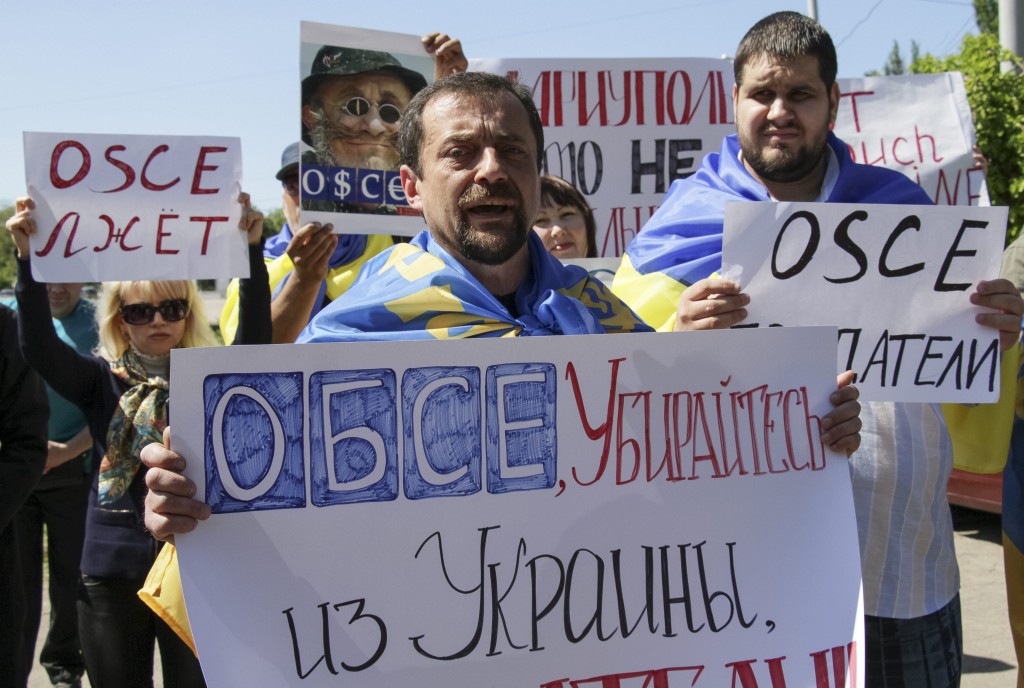Top US General ‘Impressed’ With Ukraine’s Treatment of Captured Russian Commandos
Nolan Peterson /
KYIV, Ukraine—The top U.S. Army commander in Europe praised the Ukrainian military Tuesday for how it handled the capture of two Russian special forces soldiers during a battle on Ukrainian territory over the weekend.
“I was impressed and want to congratulate Ukrainian armed forces with how they handled the capture of the two Russian solders,” said Lt. Gen. Ben Hodges, commander U.S. Army Europe, speaking to reporters in Ukraine’s capital city on Tuesday.
On May 16, the Ukrainian Aydar Battalion captured two Russian soldiers, Capt. Yevgeny Yerofeyev and Sgt. Aleksandr Aleksandrov, after a firefight with a Russian reconnaissance unit near the town of Shchastya in eastern Ukraine. One Ukrainian soldier was killed in the battle, according to Ukrainian media reports, and two more were killed in separate attacks the same day.
Both captured Russians were part of a Spetsnaz (special forces) unit under GRU (Russian military intelligence) control, and are from Tolyatti, Russia.
In a video posted to YouTube by Anton Gerashchenko, a member of the Ukrainian Parliament, Aleksandrov said he had been operating inside Ukraine since March 6.
The Kremlin continues to deny that Russian soldiers are fighting in Ukraine, referring to Yerofeyev and Aleksandrov as “former” Russian soldiers.
“We and the Defense Ministry on many occasions have said repeatedly that there are no Russian troops in Donbas,” Dmitry Peskov, a spokesman for Russian President Vladimir Putin, said at a Monday press conference.
The Russian Ministry of Foreign Affairs and the Press Service of the Russian Government did not immediately respond to requests for comment.
Hodges commended Ukraine’s transparency and ethical treatment of the captured soldiers, specifically referencing the immediate alerting of OSCE monitors and the medical care given to Aleksandrov and Yerofeyev, who were both wounded prior to their capture.
“This is another example of the professional conduct of the Ukrainian government,” Hodges said. “And this points to the importance of the OSCE being allowed to conduct the monitoring mission.”
The Organization for Security and Cooperation in Europe (OSCE) is the multinational group charged with monitoring the Ukraine conflict’s cease-fire. The OSCE’s monitoring mission in Ukraine comprises 459 monitors from 42 participating countries—including Ukraine, Russia and the United States.

People hold placards reading ‘OSCE go out from Ukraine’ and ‘OSCE lies’ as they protest against activities of Organization for Security and Cooperation in Europe (OSCE) in eastern Ukraine. (Photo: IRINA GORBASYOVA/EPA/Newscom)
“The monitoring by OSCE is essential,” Hodges said. “On the Ukrainian side of the line of contact, it’s almost completely transparent. … On the Russian-led separatist side there are large areas where we don’t have OSCE monitors and that makes it difficult to have confidence in what’s going on.”
According to U.S. and Ukrainian officials, the recent capture of Russian soldiers inside Ukraine is concrete proof that the Russian military has an active combat role in the Ukraine conflict, which is a violation of the Feb. 12 cease-fire.
“Despite statements by the Russian leadership about the lack of Russian troops in the occupied territory, now we have undeniable evidence of their presence,” Chief of the General Staff of the Armed Forces of Ukraine Viktor Muzhenko said to reporters Monday in Kyiv.
Russia’s alleged violation of the truce has raised fears that the Ukraine conflict, which has gone down in intensity since the cease-fire, might escalate again this summer. In particular, U.S. officials have voiced concerns that a buildup of Russian personnel and equipment inside separatist-controlled territory and along Ukraine’s border suggest a combined Russian-separatist offensive is upcoming.
“Russian forces used the opportunities presented by the recent lull in fighting to reset and reposition while protecting their gains,” NATO Supreme Commander Air Force Gen. Philip Breedlove said in testimony to the Senate Armed Services Committee on April 30.
“Many of their actions are consistent with preparations for another offensive,” he added.
Hodges, who was in Ukraine to evaluate the U.S. Army’s training of the Ukrainian National Guard in western Ukraine, said U.S. soldiers do not plan to leave the country early if fighting escalates.
“Everybody that wears a uniform wants to see the successful implementation of the Minsk agreement,” he said, referring to the Feb. 12 cease-fire signed in the Belarusian capital of Minsk.
“I am very confident in the quality and capabilities of what Ukraine is doing right now, and our soldiers are focused on their training mission.”
About 300 soldiers from the U.S. Army’s 173rd Airborne Brigade are in Yavoriv, Ukraine (about 800 miles from the front lines) training the Ukrainian National Guard in an exercise called Fearless Guardian.
The training began April 20 and is expected to last six months.
